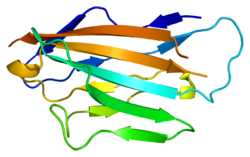Protein-coding gene in the species Homo sapiens
| MPZ |
|---|
 |
|
| Identifiers |
|---|
| Aliases | MPZ, CHM, CMT1, CMT1B, CMT2I, CMT2J, CMT4E, CMTDI3, CMTDID, DSS, HMSNIB, MPP, P0, myelin protein zero, CHN2 |
|---|
| External IDs | OMIM: 159440; MGI: 103177; HomoloGene: 445; GeneCards: MPZ; OMA:MPZ - orthologs |
|---|
|
|
|
|
|
| Wikidata |
|
Myelin protein zero (P0, MPZ) is a single membrane glycoprotein[5] which in humans is encoded by the MPZ gene. P0 is a major structural component of the myelin sheath in the peripheral nervous system (PNS).[6] Myelin protein zero is expressed by Schwann cells and accounts for over 50% of all proteins in the peripheral nervous system, making it the most common protein expressed in the PNS.[6] Mutations in myelin protein zero can cause myelin deficiency and are associated with neuropathies like Charcot–Marie–Tooth disease and Dejerine–Sottas disease.[7]
- ^ a b c GRCh38: Ensembl release 89: ENSG00000158887 – Ensembl, May 2017
- ^ a b c GRCm38: Ensembl release 89: ENSMUSG00000056569 – Ensembl, May 2017
- ^ "Human PubMed Reference:". National Center for Biotechnology Information, U.S. National Library of Medicine.
- ^ "Mouse PubMed Reference:". National Center for Biotechnology Information, U.S. National Library of Medicine.
- ^ Magnaghi V, Cavarretta I, Galbiati M, Martini L, Melcangi RC (November 2001). "Neuroactive steroids and peripheral myelin proteins". Brain Research. Brain Research Reviews. 37 (1–3): 360–71. doi:10.1016/s0165-0173(01)00140-0. PMID 11744100. S2CID 8004545.
- ^ a b Shy ME (March 2006). "Peripheral neuropathies caused by mutations in the myelin protein zero". Journal of the Neurological Sciences. 242 (1–2): 55–66. doi:10.1016/j.jns.2005.11.015. PMID 16414078. S2CID 32802793.
- ^ Shy ME, Jáni A, Krajewski K, Grandis M, Lewis RA, Li J, et al. (February 2004). "Phenotypic clustering in MPZ mutations". Brain. 127 (Pt 2): 371–84. doi:10.1093/brain/awh048. PMID 14711881.





